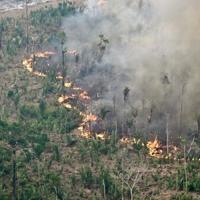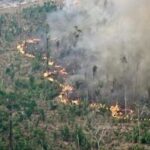Recent data shows that deforestation has continued at an alarming rate, far surpassing the goals set to eliminate the practice by 2030.
In the past year, an area nearly the size of Ireland was lost to deforestation, with 6.37 million hectares (15.7 million acres) of trees being cut down and burned.
This level of deforestation is significantly higher than what was needed to stay on track to end deforestation by the end of the decade, a goal set by global leaders in 2021.
Forests play a crucial role in housing 80% of the world’s terrestrial plant and animal species, regulating water cycles, and capturing CO2 emissions, the main greenhouse gas contributing to climate change.
Despite commitments to end deforestation, the global trend has worsened over the years, with forests continuing to be destroyed and degraded at alarming rates, according to a report by Climate Focus.
In 2023, 3.7 million hectares of tropical primary forest, known for being rich in carbon and biodiversity, were lost, hindering progress towards the 2030 objective.
– Environmental Impact –
The study also highlights the impact of deforestation in high-risk regions such as Bolivia and Indonesia.
There has been a concerning rise in deforestation in Bolivia, mainly due to the clearing of forests for agricultural purposes like soya, beef, and sugar production.
In Indonesia, deforestation rates had decreased but surged again in the past year, driven partly by the demand for materials like viscose for clothing and nickel for electric vehicle batteries and renewable energy technologies.
Brazil, despite being one of the countries with the highest deforestation rates, has shown improvements in forest protection, especially in the Amazon region. However, deforestation has increased in the Cerrado, a crucial tropical savannah ecosystem.
– Forest Degradation –
The report also addresses the role of logging, road construction, and fires in forest degradation, where land is damaged but not completely cleared.
In 2022, an area of forest twice the size of Germany was degraded due to these activities. Strong policies and enforcement are needed to protect forests and meet global conservation targets.
The report underscores the urgency of reevaluating consumption patterns and production models to reduce reliance on natural resources and mitigate deforestation.
jmi/eab/np/fg





